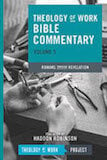Selfish Ambition (James 3:13-4:12)
Bible Commentary / Produced by TOW Project
Selfish Ambition Is the Impediment to Peacemaking (James 3:16–4:11)
Selfish ambition is the opposite of serving the needs of others. The passage is aptly summarized by James 3:16: “For where there is envy and selfish ambition, there will also be disorder and wickedness of every kind.” James highlights a particular practice that overcomes selfish ambition: peacemaking.[1] “A harvest of righteousness is sown in peace for those who make peace” (James 3:18). In typical fashion, he alludes to a workplace—grain harvesting in this case—to make his point. He names several elements of peacemaking: grieving for the harm we do others (James 4:9), humbling ourselves (James 4:10), refraining from slander, accusation, and judgment (James 4:11), and mercy and sincerity (James 3:17). All of these can and should be employed by Christians in the workplace.
Selfish Ambition Is Overcome by Submission to God (James 4:2–5)
Selfish ambition causes quarrels and fights within the Christian community, and James says the underlying cause is their failure to depend on God. “You covet something and cannot obtain it; so you engage in disputes and conflicts. You do not have, because you do not ask. You ask and do not receive, because you ask wrongly, in order to spend what you get on your pleasures” (James 4:2–3). We fail to depend on God when we don’t even ask him for what we need. Interestingly, the reason we don’t depend on God is because we want to serve our own pleasures rather than serving others. This wraps the two principles into an integral unit. James states this metaphorically as an adulterous love affair with the world, by which he means the wealth and pleasure we are tempted to believe we can find in the world without God (James 4:4–5).[2]







